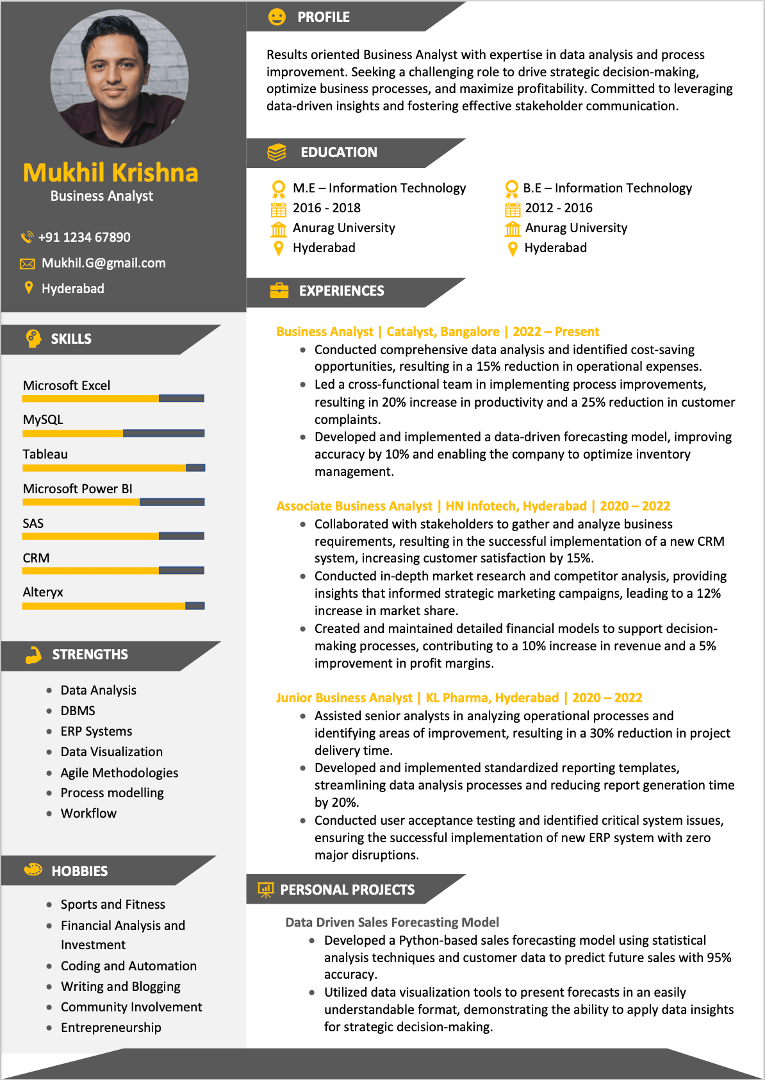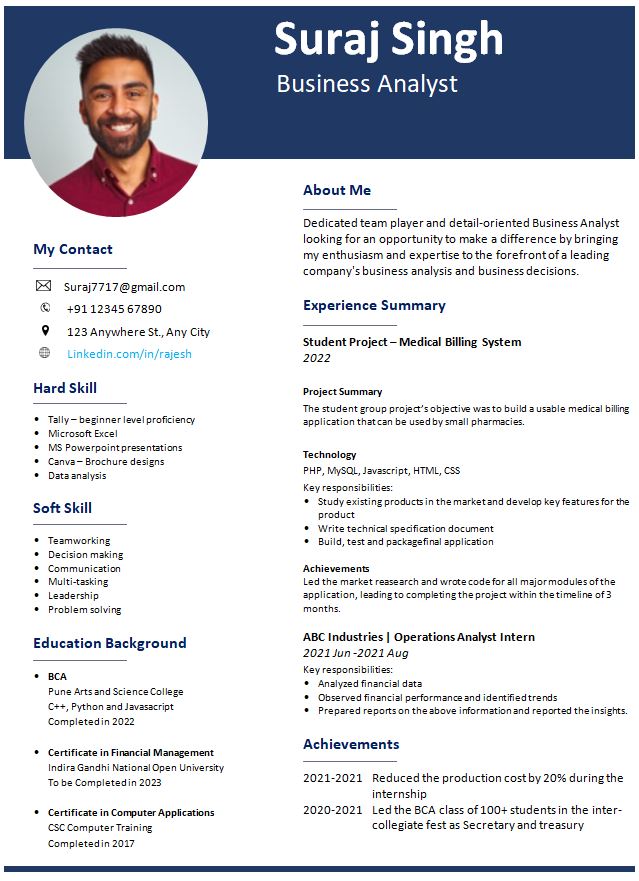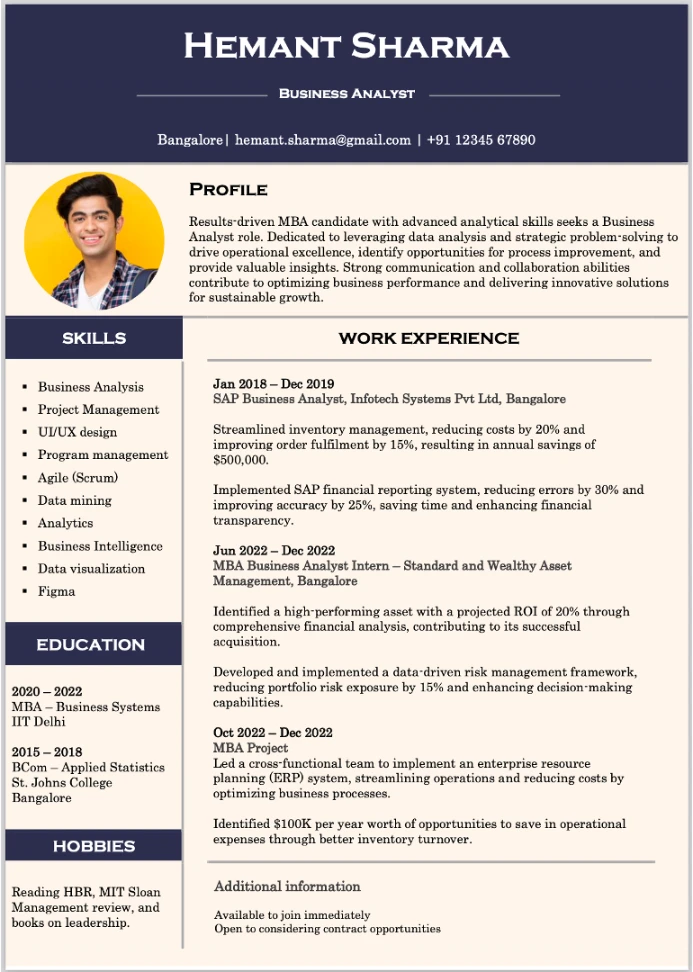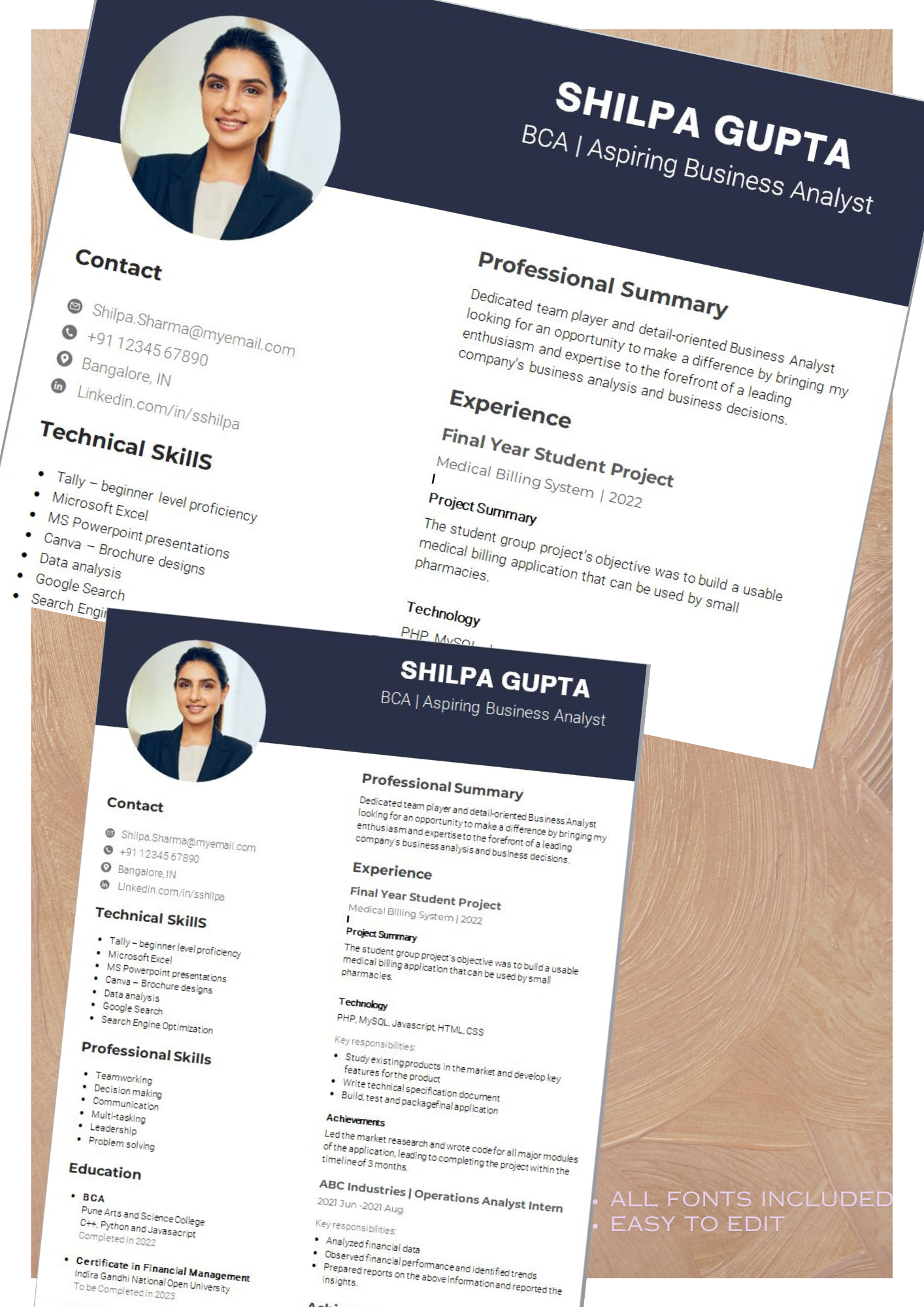Modern Resume
BE IT Business Analyst Sample Resume
Business Analyst
BizAnalyst


Objective
Here are a few career objective statement samples for Business Analyst resumes:
Career Objective 1:
Results oriented Business Analyst with expertise in data analysis and process improvement. Seeking a challenging role to drive strategic decision-making, optimize business processes, and maximize profitability. Committed to leveraging data-driven insights and fostering effective stakeholder communication.
Career Objective 2:
"Results-driven business analyst with a proven track record of leveraging advanced IT knowledge to drive operational efficiency and strategic decision-making. Offering over [X] years of experience in analyzing complex business processes, identifying opportunities for improvement, and implementing innovative solutions. Adept at translating technical insights into actionable business strategies. Seeking a challenging role where I can apply my expertise in data-driven analysis and cross-functional collaboration to contribute to the success of a forward-thinking organization."
Career Objective 3:
"Experienced business analyst with a Master of Engineering in Information Technology and [X] years of expertise in bridging the gap between technology and business objectives. Skilled in conducting in-depth requirements analysis, developing process models, and designing solutions that optimize operational performance. Seeking a dynamic role that allows me to utilize my strategic thinking, technical proficiency, and strong communication skills to support organizations in achieving their business goals. Committed to delivering high-impact results in a collaborative team environment."
Education
Bachelor of Engineering - Information Technology, Master of Engineering - Information Technology, BE IT, ME IT
Skills
Here are ten essential skills to consider including on a business analyst resume:
Analytical Thinking:
Business analysts need to dissect complex problems, evaluate data, and draw meaningful conclusions. Analytical thinking enables them to identify patterns, trends, and opportunities, leading to informed decision-making and effective problem-solving.
Requirement Elicitation:
This skill involves adeptly gathering and documenting project requirements from stakeholders. Strong requirement elicitation skills ensure that the project scope is well-defined, minimizing misunderstandings and scope creep.
Data Interpretation:
Business analysts often deal with large datasets. The ability to interpret data, extract meaningful insights, and translate them into actionable recommendations is crucial for driving informed business decisions.
Process Modeling:
Process modeling involves creating visual representations of business processes. This skill helps in understanding and communicating workflows, identifying inefficiencies, and proposing process improvements.
Stakeholder Management:
Effective communication and relationship-building with stakeholders are essential. Business analysts need to understand various stakeholders' needs, concerns, and expectations to ensure successful project outcomes.
Problem-Solving:
Business analysts encounter challenges that require creative problem-solving. This skill involves identifying root causes, brainstorming solutions, and implementing strategies to overcome obstacles.
Business Domain Knowledge:
A strong grasp of the industry and business domain is critical. It allows business analysts to understand the context of their work, make informed decisions, and provide relevant insights.
Requirement Documentation:
Precise documentation of requirements is crucial for clear communication with developers, testers, and other team members. Accurate documentation ensures that everyone is aligned and working towards the same goal.
Technical Proficiency:
While not all business analyst roles require deep technical skills, having a basic understanding of technology can facilitate effective communication with IT teams and aid in identifying feasible solutions.
Communication Skills:
Clear and effective communication is at the heart of a business analyst's role. They must translate technical jargon into understandable terms for non-technical stakeholders and convey insights persuasively.
Including these skills on your resume will help showcase your suitability for the role of a business analyst. Be sure to back up these skills with specific examples from your work experience to demonstrate how you've applied them in real-world scenarios.
Projects
If you are still in college or recently graduated and considering Business Analysis as a career option, you might want to consider working on a few projects to demonstrate to your potential employer your technical capabilities.
Here are two student project ideas that aspiring business analysts can pursue to gain practical experience and enhance their resumes:
Project idea 1 Market Analysis and Competitor Benchmarking:
Project Idea: Choose an industry of interest and conduct a comprehensive market analysis. Research and collect data on key players, market trends, customer preferences, and growth projections.
Implementation: Use tools like online surveys, industry reports, and financial data to gather relevant information. Create visualizations and charts to present your findings effectively.
Skills Demonstrated: Data collection, data analysis, market research, data visualization, report writing.
Resume Impact: This project showcases your ability to gather and interpret market data, analyze competitors' strengths and weaknesses, and make informed recommendations for business strategies.
Interests/Hobbies
Here's a list of hobbies and interests with a more technical focus that could align well with a business analyst's resume, especially if the individual has a strong technical background:
Data Analysis: Engaging in personal data analysis projects or working with datasets in your free time demonstrates your passion for data-driven insights and your technical prowess.
Coding and Programming: Showcasing proficiency in coding languages relevant to your field, such as Python or SQL, demonstrates your technical capabilities beyond your professional role.
Algorithm Design: Pursuing algorithmic challenges or participating in coding competitions highlights your problem-solving abilities and analytical thinking.
Automation: Developing scripts or tools for automating tasks underscores your ability to streamline processes and optimize workflows.
Machine Learning: Exploring machine learning concepts and experimenting with small-scale projects showcases your interest in cutting-edge technology and predictive analytics.
Dashboard Creation: Designing interactive dashboards using tools like Tableau or Power BI indicates your ability to present complex data in visually appealing and user-friendly ways.
IT Security: Demonstrating an interest in cybersecurity or ethical hacking underscores your commitment to safeguarding data and understanding potential risks.
Database Management: Working with databases, whether it's creating personal projects or optimizing existing ones, highlights your expertise in managing and utilizing data effectively.
Online Courses: Enrolling in online courses related to data analysis, programming, or other technical skills not only demonstrates your commitment to learning but also enhances your qualifications.
Gadgets and Tech Exploration: Showcasing an interest in experimenting with new technologies, gadgets, or software can highlight your curiosity and adaptability in the ever-evolving tech landscape.
Remember to tailor the hobbies and interests you include to your specific technical strengths and the skills that are most relevant to the business analyst role you're targeting. Providing concrete examples or anecdotes that tie these hobbies to your professional skills can make your resume even more impactful.
Experience
Project idea 2 Process Optimization for a Small Business:
Project Idea: Identify a small local business (e.g., a café, retail store, or service provider) and analyze its current processes. Identify pain points, inefficiencies, or opportunities for improvement.
Implementation: Interview business owners or employees to understand their workflows. Use process modeling techniques to visualize the current and proposed processes. Propose solutions such as automation, better resource allocation, or streamlined communication.
Skills Demonstrated: Process analysis, problem-solving, stakeholder engagement, process modeling, solution proposal.
Resume Impact: This project demonstrates your ability to analyze real-world business processes, identify bottlenecks, and suggest practical improvements, which is a core skill for a business analyst.
Additional Inputs
Embarking on a journey to become a skilled and sought-after business analyst requires more than just classroom learning. It demands a continuous thirst for knowledge, a passion for staying updated with industry trends, and an unwavering commitment to personal and professional growth. As you set your sights on a fulfilling career in business analysis, we encourage you to delve into these invaluable resources that can transform your understanding of the field.
From blogs that dissect real-world scenarios to podcasts that unravel the intricacies of best practices, and from magazines that offer a window into the latest tools to online courses that provide structured learning, these resources are your key to unlocking the depths of business analysis excellence.
Blogs:
BA Times: Offers articles, case studies, and insights on various aspects of business analysis.
Modern Analyst: Provides in-depth articles, templates, and resources for business analysts at all levels.
Requirements Quest: Focuses on requirements management, gathering, and analysis with practical advice.
Podcasts:
Mastering Business Analysis: Covers a wide range of business analysis topics with interviews and expert insights.
BA Learnings: Features discussions on best practices, challenges, and emerging trends in business analysis.
Magazines:
Business Analysis Digest: Offers practical tips, case studies, and industry news for business analysts.
Business Analyst Magazine: Covers the latest tools, techniques, and methodologies in business analysis.
Websites:
International Institute of Business Analysis (IIBA): The leading professional association for business analysts, offering resources, certifications, and networking opportunities.
Business Analysis Body of Knowledge (BABOK): Provides comprehensive guidelines and best practices for business analysis.
YouTube Channels:
Adaptive US: Features webinars, tutorials, and discussions on business analysis topics.
B2T Training: Offers videos on business analysis techniques, tools, and career development.
LinkedIn Groups:
Business Analysis Professional Network: Engage with professionals, ask questions, and share insights in this active LinkedIn group.
Business Analysts and Business Analysis: Join discussions on industry trends, challenges, and opportunities.
Online Courses:
Coursera: Offers courses from universities and organizations on various business analysis topics.
Udemy: Provides a range of courses on business analysis skills and tools.
Remember to engage actively in discussions, forums, and social media groups related to business analysis. Being part of these communities can help you stay updated, learn from experienced professionals, and demonstrate your dedication to the field to potential employers.
Why this template works
This resume template is a simple one and simple layouts work best for business analyst resumes because they prioritize clarity, readability, and professionalism, which are crucial qualities in the business analysis field. Here's why:
Easy Information Retrieval: Business analysts are often tasked with handling complex information and data. A simple layout ensures that the resume's content is organized logically, making it easy for hiring managers to quickly find relevant information such as skills, experiences, and education.
Clear Communication: Business analysts need to effectively communicate information and insights to various stakeholders. A simple layout reflects your ability to present information clearly and concisely, mirroring the skills needed for conveying complex ideas to both technical and non-technical audiences.
Attention to Detail: Business analysis involves meticulous attention to detail, whether it's requirements gathering or process analysis. A clean, well-organized layout demonstrates your attention to detail in presenting your own qualifications and experiences.


